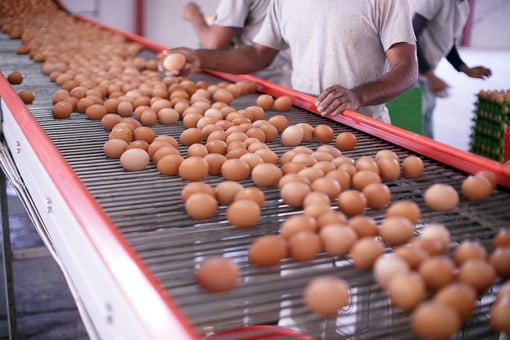
The token boost the sustainable funding of agri-food industries for climate change challenges.
People are concerned with how green there are being and between consuming organic or non-organic, eating meat or only vegetables, favoring the short circuit or products from further away. What effects will these choices have on health, biodiversity, climate and conversely, on our agri-food industries?
Agriculture and agri-food industries, an essential and highly efficient sector of the French economy, are in the heart of today's major societal and environmental challenges. In addition, the sector have a major responsibility by managing natural ressources and living heritage, which constitute their primary resources.
The recently published GIEC report shows the limits of the current development model (agricultural and industrial), both socially, ecologically, and economically. Humanity carbon footprint has increased by more than 190% over the past 50 years.
The agri-food, directed towards providing needs of the population, is at the center of a major dilemma: How continue to feed 8 billion people on earth when climate change requires an effort to reduce the planet's greenhouse gas emissions, for which the agri-food sector is one of the leading providers?
What future for the agri-food sector ?
Farmers have a challenge - to produce food whilst simultaneously protecting nature and safeguarding biodiversity and feed more than 8 billion human beings, in quantity and quality, in a sustainable way.
Agri-food is composed of a large number of sectors organized in chains from producers (the agricultural),upstream, and processors (the industrial) to distributors, downstream. The sector naturally exerts pressure on nature through its production and processing methods. It has a significant economic weight at national level, estimated at €75.5 billion in 2020, and on a European scale, it represents €1.2 trillion.
Agriculture depends more on the weather and the climate than many other sectors. The climatic consequences have impacted the balance sheet of the French sector. On the farmers' side, a large part of their production has disappeared, an inevitable consequence of a very changeable climate (in 2020: early frosts, heavy rain during the summer and drought in the south), on the industrial side, an induced degradation of the quantity and quality of products leads to a decrease in competitiveness and export volumes at the global level this year. A situation that is not expected to improve in the face of the many and rapid climate changes we are experiencing.
Supporting the orientation towards more environmentally friendly processes and new models for our agricultural and industrial sectors is essential. We must help our industries and producers to include a production of the living, sustainable, respectful of the earth, people and animals while ensuring the mission of feed population in France and abroad.
What are the solutions to be implemented ?
Giving preference to regions and of diversified and sustainable agriculture as well as to including regional products and producers. Therefore, agri-food industries must provide traditional products with regional and rare production.Multi-year contractual purchase commitments should be signed between local authorities and farmers and between regional and industrial producers (and/or distributors).

Moreover, we had to underline that all measures in favor of short transport distances contribute to may also positive impacts on biodiversity and carbon footprint. In this way, each chain stakeholder contributes significantly to reducing their impact.
Each stakeholder acts in terms of information and communication. It has a number of benefits to participates in the development of the latest knowledge on agri-food production and biodiversity. It incorporates this knowledge in company policy and activities. Using its influence and the different means of communication to inform the actors (commercial partners, suppliers, trade associations, consumers, etc). Communication raises general awareness of the need to preserve our biodiversity.
Finally, technology facilitates the implementation of solutions. Blockchain technologies allow the use and transmission of inalienable information that can be recovered using certified measurement solutions (GBS, BFFI, Greenly, Cap’2er).
The asset tokenization provides sophisticated financing solutions (rates indexed on sustainable impact, etc.) for smaller companies. VSEs and SMEs that implement climate actions can let known it and benefit from financing with a bonus/malus on the efficiency of their action.
In addition, some national and European support measures simplify and encourage the ecological and digital transition in company financing programs. These mutual approaches enable faster progress towards a biodiversity-friendly framework through the implementation of sustainable development practices in all companies.
Why and how contribute to the evolution of its sectors ?
While the success of the climate transition depends on evolution of our agricultural and food production system, these sectors are also those that are already suffering the consequences of climate change. The agricultural world is transforming its practices to become more resilient in the face of a new climate, while participating in the collective effort to mitigate global warming.
For companies, each positive action taken on impact can be used as a powerful communication tool. Today, promoting actions in favor of biodiversity and being transparent about the impact and activities products allows companies to show their commitment to social and environmental responsibility (CSR).
In a perspective of social and environmental responsibility (CSR), companies must play a role. Although corporate social responsibility has voluntary approach. France now subjects companies to a legislative and regulatory framework that takes into account the environmental pillar of corporate social responsibility (CSR).
It is clear that the gap between food supply and demand requires significant investments. Ressource constraints and ecological responsibility (quantity vs. quality) can lead to opportunities for innovation and investment. Notably by turning to new agricultural, production and financing technologies that improve productivity while being planet-friendly.
It is time to support and encourage the agri-food sector in their development by offering them financing solutions, especially crowdfunding. Which enables the entire ecosystem to be involved in joint actions. The scope of investment in this field is thus open-ended (capital goods, new generation fertilizers and pesticides, genomics applied to crops and finished products, treatment, maintenance, food packaging, etc.). The agri-food sector is in a permanent innovation ecosystem.
Although building a quality portfolio is closely linked to the sector. From a risk management point of view, supporting these companies is the right decision to make.
Re fundia offers financing solutions to allow companies to participate in the developments through the green bonds tokenization. Re fundia's solutions reduce liquidity risk and make green investments in small companies transparent. These mechanisms facilitate:
- Access to inter-firm lending for project leaders;
- the contribution of ecosystems to the carbon neutrality of their environment by participating directly in projects financing;
- the emergence of a secondary market for unlisted digital debt securities.
Re fundia offers an innovative framework to promote the financing of companies by tokenized assets securities. Re fundia reduces the intermediaries and simplifies over-the-counter exchanges of unlisted bonds between funders.